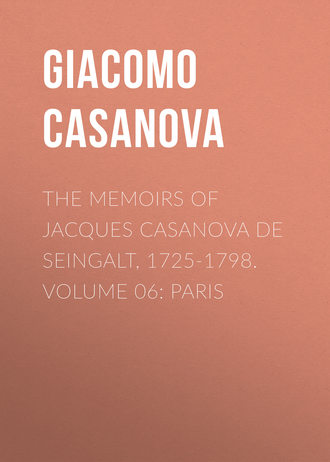 полная версия
полная версияThe Memoirs of Jacques Casanova de Seingalt, 1725-1798. Volume 06: Paris
In Dresden I had frequent opportunities of seeing the king, who was very fond of the Count de Bruhl, his minister, because that favourite possessed the double secret of shewing himself more extravagant even than his master, and of indulging all his whims.
Never was a monarch a greater enemy to economy; he laughed heartily when he was plundered and he spent a great deal in order to have occasion to laugh often. As he had not sufficient wit to amuse himself with the follies of other kings and with the absurdities of humankind, he kept four buffoons, who are called fools in Germany, although these degraded beings are generally more witty than their masters. The province of those jesters is to make their owner laugh by all sorts of jokes which are usually nothing but disgusting tricks, or low, impertinent jests.
Yet these professional buffoons sometimes captivate the mind of their master to such an extent that they obtain from him very important favours in behalf of the persons they protect, and the consequence is that they are often courted by the highest families. Where is the man who will not debase himself if he be in want? Does not Agamemnon say, in Homer, that in such a case man must necessarily be guilty of meanness? And Agamemnon and Homer lived long before our time! It evidently proves that men are at all times moved by the same motive-namely, self-interest.
It is wrong to say that the Count de Bruhl was the ruin of Saxony, for he was only the faithful minister of his royal master's inclinations. His children are poor, and justify their father's conduct.
The court at Dresden was at that time the most brilliant in Europe; the fine arts flourished, but there was no gallantry, for King Augustus had no inclination for the fair sex, and the Saxons were not of a nature to be thus inclined unless the example was set by their sovereign.
At my arrival in Prague, where I did not intend to stop, I delivered a letter I had for Locatelli, manager of the opera, and went to pay a visit to Madame Morelli, an old acquaintance, for whom I had great affection, and for two or three days she supplied all the wants of my heart.
As I was on the point of leaving Prague, I met in the street my friend Fabris, who had become a colonel, and he insisted upon my dining with him. After 'embracing him, I represented to him, but in vain, that I had made all my arrangements to go away immediately.
"You will go this evening," he said, "with a friend of mine, and you will catch the coach."
I had to give way, and I was delighted to have done so, for the remainder of the day passed in the most agreeable manner. Fabris was longing for war, and his wishes were gratified two years afterwards; he covered himself with glory.
I must say one word about Locatelli, who was an original character well worthy to be known. He took his meals every day at a table laid out for thirty persons, and the guests were his actors, actresses, dancers of both sexes, and a few friends. He did the honours of his well-supplied board nobly, and his real passion was good living. I shall have occasion to mention him again at the time of my journey to St. Petersburg, where I met him, and where he died only lately at the age of ninety.









